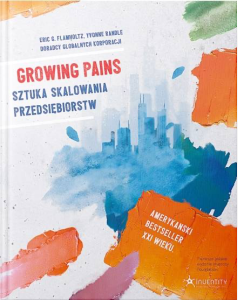Growing Pains. Sztuka Skalowania Przedsiębiorstw
“Growing Pains. Sztuka skalowania przedsiębiorstw” is the result of over 40 years of work and experience of Prof. Eric G. Flamholtz and Prof. Yvonne Randle. The book introduces the reader to the subject of Growing Pains, which inhibit the growth of companies and their ability to sustainably generate value over the long term. There are many case studies in the book. You will find out why some companies fail and others achieve market success. It is written in an accessible and light way. At the same time, it is empirically verified and documented knowledge.
This book will teach you how:
- increase the scale of the company’s operations
- plan and implement effective tools to generate growth
- minimize the risks associated with the development of the organization
You will learn methods of minimizing 10 classic Growth Barriers identified in most organizations:
- No time to complete tasks on time
- Too much time spent “putting out fires”
- Lack of knowledge about the work of other members of the organization
- Lack of knowledge about the direction of the organization’s development
- Too few competent managers
- Convincing about the high quality of task performance only in the absence of task delegation
- Seeing meetings as a waste of time
- Failure to implement the assumed plans and tasks
- Lack of comfort and certainty about the future of the workplace
- No correlation between sales growth and profit growth
“The transformation of a company from a local micro-enterprise to a dynamically developing, international business poses great challenges. Growing pains provides specific tools that allow you to identify and eliminate the most important barriers to growth. Consistent, ready-made formulas to help you implement strategic management practices instead of “putting out fires.”
“In times when the future is not what we thought it would be, a strategic and timeless approach to managing an organization’s culture for its success is of particular importance. Growing Pains tells the REAL stories we experience when running our businesses, regardless of industry or scale”
“Required reading for start-ups, small and medium-sized family businesses and corporations. It shows in an orderly way how to move the company to a higher level of development and how to earn more. It shows the danger of abandonment and routine in business. All supported by data and great experience of the authors.”
“I believe that if this book had been published at the beginning of the process of building an economy based on individual entrepreneurship and had become required reading, with passing exams being a condition for registering a company, today’s economic landscape in Poland would perhaps be slightly different. Perhaps then our economy for almost 27 years would not be based on the cheap labor model imposed on Poles in the 1990s. Perhaps the entrepreneur cited gained insight into other success factors of the company and his employees had more opportunities in their lives due to the higher salary, as the entrepreneur would simply start thinking strategically and apply the resulting tools to grow the company.”
“Growing Pains. The Art of Scaling Enterprises is a must read for every entrepreneur who wants to grow their business but doesn’t know how (or is afraid to ask). Although it may seem like a textbook, due to the interesting examples and specific tools for solving problems, which are based on the rich professional experience of the authors and many years of research conducted by them, its reading is a pleasure for a business practitioner or theoretician interested in the subject .
There is probably no company that would not like to grow, have more and more revenues (profits), achieve better and better results. Which company would not like to be like the American Facebook, Sturbucks, Wallmart? Most organizations have such aspirations and plans. It is also often the case that the managers and owners of these companies think that since they have managed to start, enter the market with a product, sell and earn money, it is not difficult and that they know how to implement these plans. Unfortunately, specific business cases known to me, as well as statistics, show that this knowledge is not always sufficient or adequate, and very few owners and founders are able to hand over their company to a professional manager at the right moment, as the authors of the publication write about. This is one of the reasons why around 50% of new ventures disappear from the market in the first 5 years. In Poland, 300-400 thousand companies are established each year, but also a similar number of companies stop operating, not living to see the first, second and subsequent years of their business lives. In addition, companies generally grow slowly and statistically there are too many micro (most), small and medium-sized companies. Although there is a relatively large amount of start-ups, their ability to survive is even smaller and only a small percentage of them are able to go through the process from the creation of an idea to a mature organization, where procedures and an organized way of functioning must be introduced. A good product is not everything, the authors write, because there will always be a company on the market that will copy or counterfeit this product. Something more matters. Most companies feel the growing pains, i.e. symptoms of an organization disease. Professor Esic Flamholtz (whom I had the pleasure of meeting in person) and Yvonne Randle in the book give examples of growing pains, but also medicines to minimize or completely eliminate them. They provide specific solutions and answers to the questions probably bothering many interested in the subject of business development – why is it so and what determines that some companies are successful and manage to move from the stage of an enterprise to the stage of a professionally managed company, and others often even after a spectacular success disappear from the market, although they often have a good product? Are there any particular factors that influence this success or failure? The authors of the publication claim that they do and support this claim with the results of their more than 40 years of consulting cooperation with American business. According to them, the key elements of success such as the market, product, resources, operating systems, management systems and organizational culture must perfectly harmonize with each other and an organization that does poorly on any of these elements will experience development problems sooner or later. In the publication you can also find a unique tool – the organization pyramid, which allows you to assess the degree of organizational development. All this makes the book very useful in the daily management of the company.
And one more interesting topic that the authors of the book drew attention to. Reading the book, according to them, requires conceptual thinking and according to them, it is one of the most important skills of a good leader of a growing organization. At the same time, they state that such a way of thinking, which I believe, can be experienced by reading “Growing Pains. The art of scaling enterprises” brings huge benefits not only in business.


